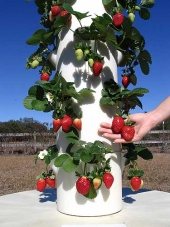My husband, daughter and I live in Henley on Thames,UK. I was born in the UK but raised in South Africa where I met my husband. Economic circumstances meant we had to relocate to the UK, which gave us the opportunity to put in motion a plan to gain financial independence when we relocate back to South Africa. As country folk, we would naturally use our skill set to start our own small scale farming operation, which we had done before with feedlot cattle and broiler chickens and the cash crop of tomatoes planted in neat rows, water and fertiliser and bug stuff pumped all over it. We failed miserably because we couldn't compete with the big boys with their millions of "units" of product.I was immensely excited to stumble across permaculture and particularly permies.com. This was a way to raise crops and animals naturally (permaculture ethic 1), while keeping costs low meaning you don't have to try to squeeze in as many head/m2 and source unnatural feed sources. It would be wonderful to be able to meet our needs and share (permaculture ethic 2) without having to crunch numbers and work like trojans. The other issue is that thousands of South Africans find themselves in the same predicament we were in without the opportunity we had to relocate. We believe we can help them (ethic 3) in their communities to utilise the space and limited resources to feed their families, maybe create an income stream and help restore their dignity. But obviously we cant just jump in the deep end , like everything else we have to undertake a learning curve. I mention this purely to give a background and reason for the project.
So, we are employed by and live on an equestrian stud farm, in a small house with a small yard. We have various rules we must keep (eg:no chickens in the yard) and require permission for any changes/additions we make to the property. I definitely would not be able to build a hugelkulture bed! The yard was just a grass patch when we moved in. Over 2 years I have added the beds, greenhouse, patio etc The width of garden is east facing so the one fence is mostly in shade while the other gets a lot of sun, the back fence is shaded in the morning and gets afternoon and evening sun.
I have read/listened/watched a lot of material on no-water systems as the South African Highveld has summer rainfall, in thunder showers with baking hots days so lots of surface evaporation. I am trialling well rotted manure mulch and straw mulch.
Last year I added the bed behind the greenhouse in the winter, put down cardboard and topped it up with the bottom of the muck heap pile from the stables, left it for 3 months before planting in the spring with strawberries and raspberries in the front ( I covered the bed with membrane and planted the strawbs in holes-this was before permaculture!) and the back stayed empty until I planted tomatoes and leeks in the summer. So still monoculture really, i must admit, I am struggling with broadcasting seed everywhere and allowing nature to take it's course! But my aim is essentially water retention in the soil. So I am happy to continue with monoculture at present, I just want to see if they will grow under mulch. I also know the climate conditions are very different between where we are now and SA, I think with the winter rainfall in the UK we actually get less rain in the growing season than SA, so I do have a micro sprinkler system which I try to limit to once a week.
After attending the online food summit, I have decided to trial the deep straw mulch. As I dont think I will get approval to add another bed to the garden, I have started a "hidden garden" in the central area of the horse walker. No one can see it so they wont know it's there! I will attach pictures on my next update-I can only attach 3 files now. My husband cut down the natural vegetation, we covered it with about 8" well rotted horse poo and topped it off with over a foot of straw. I am waiting til the last frost dates pass before planting it with hubbard squash and gem squash. I did put a soaker hose under the straw just in case we need to water.
The other thing I am trying is using chickens to make
compost, provide food, kill bugs etc without being fed grains. As I couldn't have them at home, I got permission to put them in a small wood far away from the house. We started with 3 hens from a free range egg farm who were clearing out stock. Then my daughter got 4 battery hens. While I know these aren't at the optimal age for laying lots of eggs, I am thinking they will provide enough eggs for me and my 2 neighbours who save scraps for me. Also, we can give a home to some pretty poor looking chooks who love being out. I'll post pictures when I can.
Phase 4 will be trying meat chickens on the same model.
I am hoping to tie the three ideas into a workable unit to offer a food security system to the communities mentioned above.

 1
1







 1
1







 1
1































